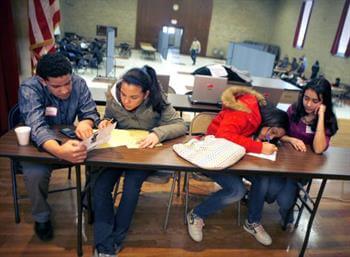
LYNN – Often a philanthropist’s donation begins and ends with the writing of a check, for scholarships, college tuition, or endowed chairs.
But Bob Hildreth, a Boston investment banker and longtime immigrant rights activist, is asking for something in return as part of his effort to help Hispanic students from Lynn pay for some college expenses.
He is offering to put aside $50 a month for each student enrolled in his La Vida Scholars program, if they or their parents do the same. It’s a strategy designed to encourage a greater appreciation for higher education and an increased focus on saving money for college.
By having parents put away money, Hildreth hopes they will be more inclined to persuade their children to stay in school and earn a college degree, helping to reverse low high school and college graduation rates for Hispanic students. Many parents, Hildreth said, have the financial resources to honor such a commitment, noting that thousands of immigrants regularly send money to family members, including some of their other children, who live in their home countries.
“I’m saying to Lynn parents: Keep your money here for your children’s education,” Hildreth said. Later he added, “If the parents have not put up real money for college expenses, if they don’t have a personal commitment to their children doing well, then the students don’t finish college. Immigrant families have little to no experience in paying for school.”Setting aside the monthly savings can be financially difficult for some families, “but the program makes it easier,” Rigoberto Tercero, whose son is in the program, said speaking through an interpreter.
La Vida Scholars, a year-old program designed to help Latino students prepare for and apply to colleges, is one of Hildreth’s latest efforts to help the state’s Latino community. Two years ago, he adopted a similar strategy of shared responsibility when he helped bail out undocumented immigrants taken into custody after a federal raid of a New Bedford leather goods factory. Although he put up more than $200,000 of his own money, in each case a family member covered a portion of the bail.
Now, the college savings and bail programs could be expanded to other states through the creation of the Foundation for an Open America, which Hildreth is setting up on Boylston Street in Boston. Hildreth, a Roman Catholic who tried a career as a teacher twice, became interested in Hispanic causes while working for the International Monetary Fund in Bolivia in the 1970s. He later traded bonds in that region during the 1980s and 1990s.
La Vida Scholars is an outgrowth of La Vida Inc., a nonprofit that Hildreth and St. Joseph Church in Lynn started about a decade ago to improve the academic success of the city’s Hispanic students. Nearly half of the 13,300 students in the Lynn public schools are Hispanic. St. Joseph, a Catholic church with approximately 2,000 Latino members, sought out Hildreth because of his previous support of schools in Chelsea, another city with a large Latino population. As in many other Bay State communities, Latinos in Lynn struggle to finish high school. Last year’s four-year graduation rate for them was 66 percent – about 15 percentage points below the overall state average. Hildreth is hoping to help more Latinos complete high school and go on to colleges.
Wanting a better life for his four children, Gerardo Almonte took up Hildreth on his savings offer at the start of this school year when his son, Alexander, joined La Vida Scholars. “I know Alexander is going to need the money,” said 43-year-old Almonte, who works the overnight shift at Logan Airport. “I try to teach my kids the future is to be in school.”
But the savings plan, he said, will leave less money available to send to the Dominican Republic, where his father, a retired police officer, and other family members live. Whenever Almonte can, he tries to send $50 or $100. “I know they need it,” said Almonte, who did not attend college. “Things are more expensive there.”
Because many immigrant parents never went college themselves, the process of choosing, applying to, and paying for higher education is largely foreign to them, immigrant advocates say.
Nationally, 47 percent of Hispanic students last year earned bachelor’s degrees six years after enrolling in college, almost 10 percentage points below the average for all students, according to US Department of Education data released this month.
The college savings plan is just a small part of La Vida Scholars, which helps about 30 sophomores and juniors. Twice a week for three hours at a time, the participants flock to an activity center at St. Joseph Church. There, the students receive help in preparing for the MCAS, the SAT, college searches, and applications.They also tutor younger students in the after-school program. Recently, students visited colleges in Boston and Amherst.
“A lot of girls here would be home helping their mothers cook and clean, but how is that going to help you get into college?” said Wilma Barrios, a junior at Lynn Classical High School. “You have to keep moving yourself forward.”
The program also offers monthly workshops for parents to learn about a variety of topics pertaining to college preparation, while a parent advisory board is developing guidelines for proper usage of the saved money. The bank accounts, which are in the program’s name, will not be used for tuition but for activities that can enrich the college experience, such as tutoring, computers, and study abroad programs.
“My parents didn’t know how expensive college was,” said Tracy Aguila, a Lynn Classical junior. “They thought it was like high school – free.”
By James Vaznis, Boston Globe Staff
March 17,2009